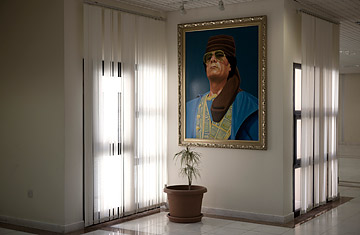
A portrait of Libyan leader Muammar Gaddafi hangs in Tripoli.
The warning couldn't have been clearer. Libya's water-supply network, a multibillion-dollar project that pipes clean water from underground reserves in the south to some 4.5 million residents along the coast, is at risk. If an air strike hits one of the 3,000 manholes along the pipeline, says Abdul Majid Qa'oud, Agricultural Minister and chairman of the Great Manmade River People's Committee, the whole system will break down. "It will be a humanitarian disaster," he says.
That such an extensive pipeline network — when it was completed, Muammar Gaddafi boasted that it was the eighth wonder of the world, with enough concrete to pave a road all the way to India — should have no emergency backup system beggars belief. A media tour of the network's control center was an indication of a regime desperately seeking ways to prove its relevance to a captive press corps grown weary of being spoon-fed propaganda on organized excursions.
Signs that Gaddafi's regime is rapidly losing popularity in the capital are plentiful and obvious, even to journalists imprisoned in the luxurious confines of a well-orchestrated p.r. machine. In a move that will hearten dissidents, Italy has taken the strongest stance yet against the regime. Italian Foreign Minister Franco Frattini told Reuters in Rome on Monday, April 4, that a divided Libya was not acceptable and that the rebel council was the only legitimate interlocutor.
And while state TV broadcasts recorded scenes of jubilant pro-Gaddafi crowds on a loop, their real-time incarnations tell a different story. The throngs of supporters who used to greet the journalists' bus upon its arrival at the hotel have disappeared, and the rallies of the regime faithful have diminished. One bystander at Sunday's anti-U.N. protest in Tripoli suggested a little too loudly that the young men stomping on President Obama's photo were being paid — 150 dinars a day, he had heard.
Mahmoud Ali, a Finance Ministry employee standing nearby, rebutted the comment, saying that the rally was purely spontaneous. Dressed in a tuxedo, he proudly stated that his wife had ironed his shirt the night before in anticipation of his appearing in front of the national and international media. When the contradiction was pointed out, he allowed that he had been ordered in a phone call the night before to attend. Nevertheless, he said, he supported the regime. Not so everyone. "I am sick of all this," said another bystander. "I have had enough of the regime."
Whispers on the sidelines of manufactured pro-Gaddafi rallies, when taken together, equate a roar. But an army of whisperers is not enough to topple a regime that has the full might of a military willing to turn its weapons on its own people. "We could stand up against the regime," says one Tripoli resident. "But they would take us down like birds."
As the front lines of the battle between the eastern rebels and Gaddafi's forces yo-yo across Libya, the possibility of a diplomatic solution has breathed hope into what was starting to look like an interminable stalemate.
According to news reports, a senior Libyan official is in Greece to talk about a potential solution, though Frattini has deemed the proposal "not credible." Still, it shows that the regime may be sweating a little more than it cares to let on. A representative of Gaddafi's son Saif al-Islam has recently returned from London, where he presented a proposal that would see the son take power from the father in an eventual transition to some kind of representative government.
